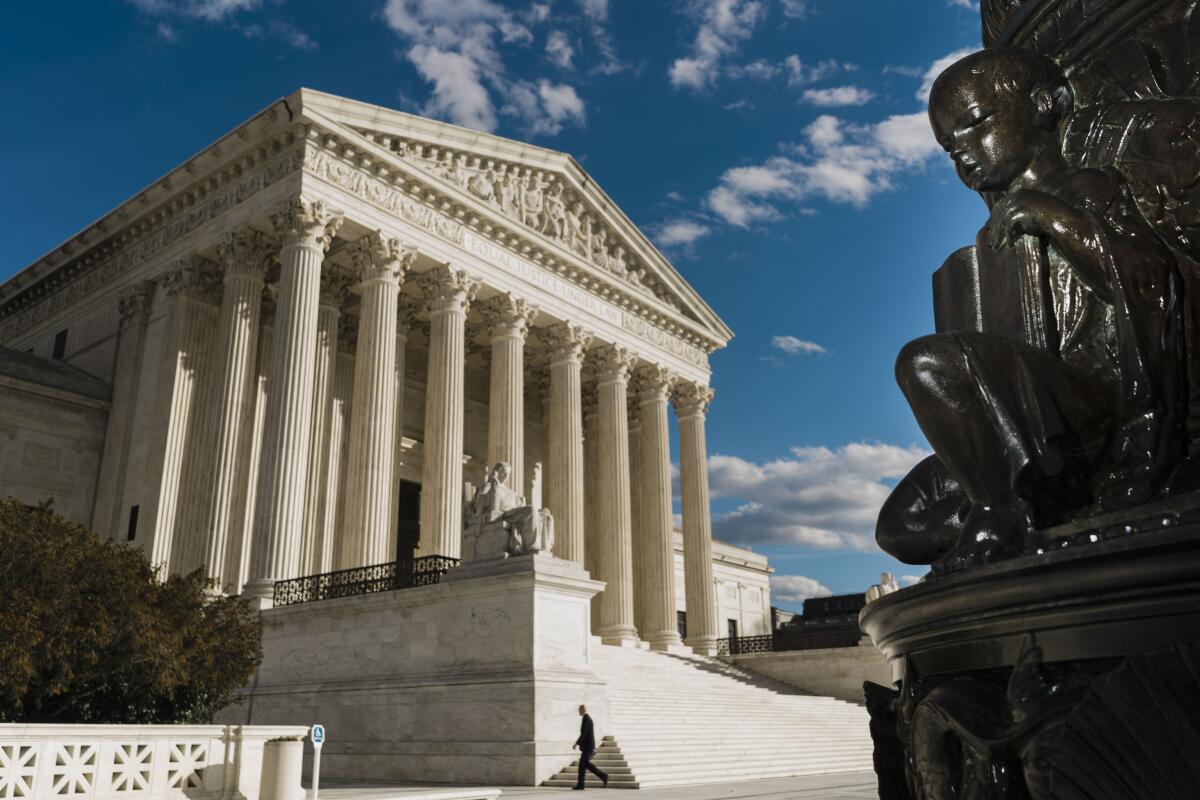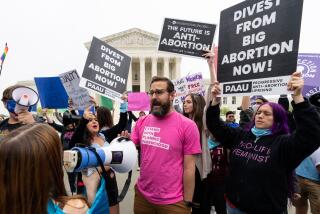Supreme Court divided on adoption law that keeps Native American kids in tribal homes

- Share via
WASHINGTON — Supreme Court justices sounded sharply split Wednesday on whether to strike down a federal child custody law that seeks to keep Native American children with tribal families.
The court’s three liberals, joined by Justice Neil M. Gorsuch, strongly defended the law. They said the Constitution gave Congress broad authority to protect Native Americans and the future of their tribes.
“This is a matter for Congress, not the courts,” Justice Elena Kagan said.
But four of the court’s conservatives were skeptical of the race-based preferences in the Indian Child Welfare Act, or ICWA, saying they sometimes prevent adoptions that might be in the best interest of the child.
The issue arose in Texas after the Navajo Nation intervened to block the adoption of a baby by a white couple in Fort Worth who had been fostering the child for nearly a year.
Justice Brett M. Kavanaugh questioned whether it was appropriate or constitutional to prevent such an adoption simply because the couple are “the wrong race.”
Last week, the court heard arguments on whether to strike down the use of race as a factor in college admissions, and several of the conservative justices said the issue in Wednesday’s case looked similar.
The outcome may depend on Justice Amy Coney Barrett, who is a conservative and the mother of two adopted children. She did not tip her hand as to how she might rule.
She said that if laws involving the tribes are based on political classifications, they are generally legal. But treating people differently because they are Native Americans might be seen as a racial classification, which would be generally illegal, she said.
Tribal courts have jurisdiction over child custody cases taking place on Native American lands, but states handle matters of foster care and adoptions of Native American children not living on tribal land.
The 1978 law was an effort by Congress to impose minimum federal standards for those adoptions not handled by tribal courts, particularly in cases of governmental removal of children from their families because of safety or social welfare concerns. Among other things, the law requires notifying the tribe if a child of a tribal member is placed for adoption.
The law also set a preference for placing a child with a member of his or her extended family, with other members of the tribe or with other Native American families.
Congress said the law was intended to protect the best interests of Native American children and to promote the safety and
security of tribes and families.
Lawmakers were responding to long-standing complaints that Native American children were being removed from their families and tribes, and being raised in boarding schools or by white families, cut off from their heritage.
More than a third of Native American children were being removed from their families in some states, Congress said at the time. And 90% of those children were placed with non-Native American families.
Supporters of the law say it has worked to keep Native American children with their families. Such children still “are disproportionately represented in foster care, but it is better than before ICWA,” said Kate Fort, director of the Indian law clinic at Michigan State. “We still have work to do.”
Los Angeles County, which has one of nation’s largest populations of Native American children, voiced support for the law.
“The purpose of the ICWA would be defeated if it applied to Indian tribes operating only on or near a reservation because it would exclude residents of Los Angeles County, home to the largest American Indian and Alaska Native population of all counties in the United States, but without a single federally recognized Native American tribe within its borders,” the county wrote in a court filing.
Critics of the law say it has sometimes worked against the best interest of the children by sending them to live with distant relatives they have never known, rather than allowing them to be adopted by their current foster families.
Chad and Jennifer Brackeen, a Texas couple, agreed to care for a 10-month-old boy after state officials removed him from his mother, who was a Navajo. She and the father voluntarily terminated their parental rights and supported their son’s adoption by the Brackeens.
But a year later, Navajo officials intervened to block the adoption and send the child to live with other tribal members. A state judge denied the Brackeens’ adoption petition based on the federal law, but the Texas couple prevailed when the placement arranged by the Navajos withdrew.
The Brackeens later tried to adopt a second child from the same Navajo mother, believing the young girl would benefit from being raised with her brother. The couple decided to lead a lawsuit on behalf of other families challenging what they called the discriminatory provisions of the law.
Texas Atty. Gen. Ken Paxton sued as well and referred to the federal law as an unconstitutional “race-based scheme.”
He argued that the Constitution’s guarantee of “equal protection of the laws” forbids discriminating among people based on their race. He also argued the law violated the 10th Amendment and the principle of states’ rights by imposing federal standards.
The issues in the case split federal courts in Texas, which upheld parts of the law and struck down others. Four separate appeals came before the high court, including one filed on behalf
of Interior Secretary Deb Haaland, the first Native American to hold a Cabinet post.
The court combined the appeals and agreed to hear them together in the case of Haaland vs. Brackeen.
More to Read
Get the L.A. Times Politics newsletter
Deeply reported insights into legislation, politics and policy from Sacramento, Washington and beyond. In your inbox three times per week.
You may occasionally receive promotional content from the Los Angeles Times.











